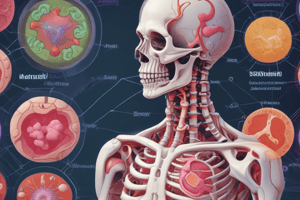Podcast
Questions and Answers
What effect does a decrease in the blood concentration of calcium ions have on myocardial contractility?
What effect does a decrease in the blood concentration of calcium ions have on myocardial contractility?
- The extensibility of the myocardium decreases
- The elasticity of the myocardium is increased
- Myocardial contractility is reduced (correct)
- The tone of the myocardium increases
How does an increase in the concentration of potassium ions in the blood affect heart rate?
How does an increase in the concentration of potassium ions in the blood affect heart rate?
- No effect on heart rate
- Reducing heart rate
- Causes bundle branch block
- Increased heart rate (correct)
Where are the centers of sympathetic innervation of the heart located?
Where are the centers of sympathetic innervation of the heart located?
- Medulla
- Thalamus
- Upper cervical segments of the spinal cord
- Lateral horns of the thoraco-lumbar spinal cord (correct)
Which neurotransmitter is released in the endings of vagus nerve fibers that innervate the heart?
Which neurotransmitter is released in the endings of vagus nerve fibers that innervate the heart?
What effects does the vagus nerve have on the heart?
What effects does the vagus nerve have on the heart?
How does the negative chronotropic vagal effect on the heart relate to slow diastolic depolarization?
How does the negative chronotropic vagal effect on the heart relate to slow diastolic depolarization?
What effect does a decrease in blood concentration of calcium ions have on myocardial contractility?
What effect does a decrease in blood concentration of calcium ions have on myocardial contractility?
What happens when the concentration of potassium ions in the blood increases?
What happens when the concentration of potassium ions in the blood increases?
Where are the centers of sympathetic innervation of the heart located?
Where are the centers of sympathetic innervation of the heart located?
Which neurotransmitter is released in the endings of fibers of the vagus that innervate the heart?
Which neurotransmitter is released in the endings of fibers of the vagus that innervate the heart?
How does the vagus nerve affect the heart?
How does the vagus nerve affect the heart?
How is the negative chronotropic vagus effect on the heart related to slow diastolic depolarization?
How is the negative chronotropic vagus effect on the heart related to slow diastolic depolarization?
To block the inhibitory parasympathetic effects on the heart, which type of receptor blocker should be used?
To block the inhibitory parasympathetic effects on the heart, which type of receptor blocker should be used?
What neurotransmitter do the endings of sympathetic nerves, innervating the heart, secrete?
What neurotransmitter do the endings of sympathetic nerves, innervating the heart, secrete?
Which blocker is effective in eliminating the influence of sympathetic nerves on the heart?
Which blocker is effective in eliminating the influence of sympathetic nerves on the heart?
What effects do sympathetic nerves cause in the heart?
What effects do sympathetic nerves cause in the heart?
The positive chronotropic influence of sympathetic nerves on the heart is connected to:
The positive chronotropic influence of sympathetic nerves on the heart is connected to:
What does the Danini-Aschner reflex involve?
What does the Danini-Aschner reflex involve?
Flashcards are hidden until you start studying
Study Notes
Myocardial Contractility and Calcium Ions
- Decreased blood calcium ion concentrations lead to reduced myocardial contractility, impairing heart muscle contraction strength.
Potassium Ions and Heart Rate
- Increased potassium ion levels in the blood can lead to a decrease in heart rate, as hyperkalemia affects the resting membrane potential of cardiac cells.
Sympathetic Innervation of the Heart
- Centers for sympathetic innervation of the heart are located in the thoracic spinal cord, specifically in the T1 to T4 levels.
Vagus Nerve Neurotransmitter
- The neurotransmitter released at the endings of vagus nerve fibers that innervate the heart is acetylcholine.
Effects of the Vagus Nerve
- The vagus nerve exerts a parasympathetic influence, leading to slowed heart rate (negative chronotropic effect) and decreased myocardial contractility.
Vagal Influence and Diastolic Depolarization
- The negative chronotropic effect of the vagus nerve is associated with slow diastolic depolarization, which prolongs the interval before depolarization occurs, thereby reducing heart rate.
Receptor Blockers for Parasympathetic Effects
- To counteract inhibitory parasympathetic effects on the heart, muscarinic receptor blockers such as atropine should be used.
Sympathetic Nerves Neurotransmitter
- Sympathetic nerves that innervate the heart secrete norepinephrine at their endings, stimulating an increase in heart rate and contractility.
Blocking Sympathetic Influences
- Beta-adrenergic blockers are effective in eliminating the positive influence of sympathetic nerves on heart rate and contractility.
Effects of Sympathetic Nerves
- Sympathetic nerve activation results in increased heart rate (positive chronotropic effect) and enhanced myocardial contractility (positive inotropic effect).
Positive Chronotropic Influence
- The positive chronotropic influence of sympathetic nerves on the heart is connected to increased intracellular calcium levels, enhancing contractility and excitability.
Danini-Aschner Reflex
- The Danini-Aschner reflex involves a response to changes in heart rate due to variations in venous return and atrial filling, linking changes in blood volume to cardiac output regulation.
Studying That Suits You
Use AI to generate personalized quizzes and flashcards to suit your learning preferences.




